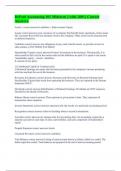Exam (elaborations)
DePaul Accounting 101 Midterm || with 100% Correct Answers.
- Course
- Institution
Assets = correct answers Liabilities + Share-owners' Equity Assets correct answers econ. resources of a company that benefit future operations. Some assets like Accounts Receivable are amounts owed to the company. Other assets can be characterized as deferred expenses. Liabilities correct ans...
[Show more]



